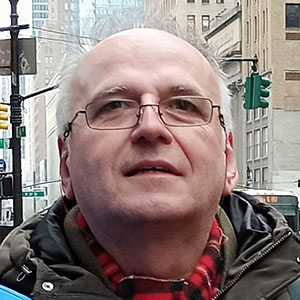
Pavlos Zarogiannis
Country: Greece
Organization: Hellenic Focusing Center
Short CV
Pavlos Zarogiannis has studied Clinical Psychology, German literature, and Linguistics in Germany. He lives and works in Athens as a person-centred therapist, supervisor, and trainer in Person-Centered and Focusing-Oriented Counselling and Psychotherapy. He is Co-founder and Co-director of the Hellenic Focusing Center and also a certified coordinator for Greece in the International Focusing Institute (TIFI). He has interests in literature, art, and philosophy.
Round-table discussion
(together with: Anna Apergi-Konstantinidi & Parvy Palmou & George Kesisoglou)
Title: Gender, identity, and sexuality as multiplicities: heteroglossia and polyphony
It seems that, in recent years, what Aristotle once formulated is increasingly accepted, namely that “it seems impossible for all things to be one” and that ultimately the “one… is many”. This notion seems almost self-evident, if one considers, even for a moment, the diversity of all living beings, humans included. It is a notion that could lead to a horizontal distribution, mutual recognition, and equal acceptance of all living beings.
And yet: the one may be many, but the many were sacrificed, and continue to be sacrificed, in the name of the one. Because what has prevailed and what has been imposed for centuries is categorization, grouping, and homogenization, as well as the vertical hierarchy of homogenized categories and groups, something that led, and still leads, to prohibitions, marginalization, exclusions, and conditional inclusions with painful, traumatic, and sometimes tragic consequences for those who belong to the arbitrarily and pejoratively called “minority” groups.
Maybe now is the time to remember Aristotle’s saying about the multiplicity of beings and to reflect on their heteroglossia and polyphony. And, of course, it is also a time for us to contemplate the depth and implications of this saying at all levels of our psychotherapeutic practice. And this not only in relation to our patients, but also to us as therapists.

